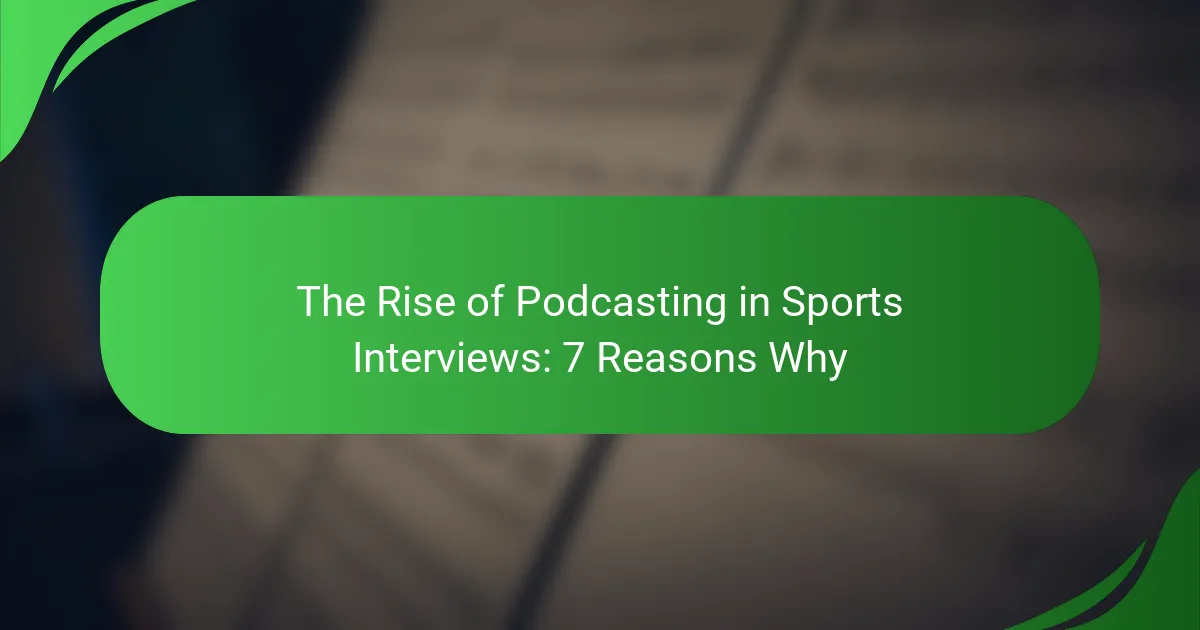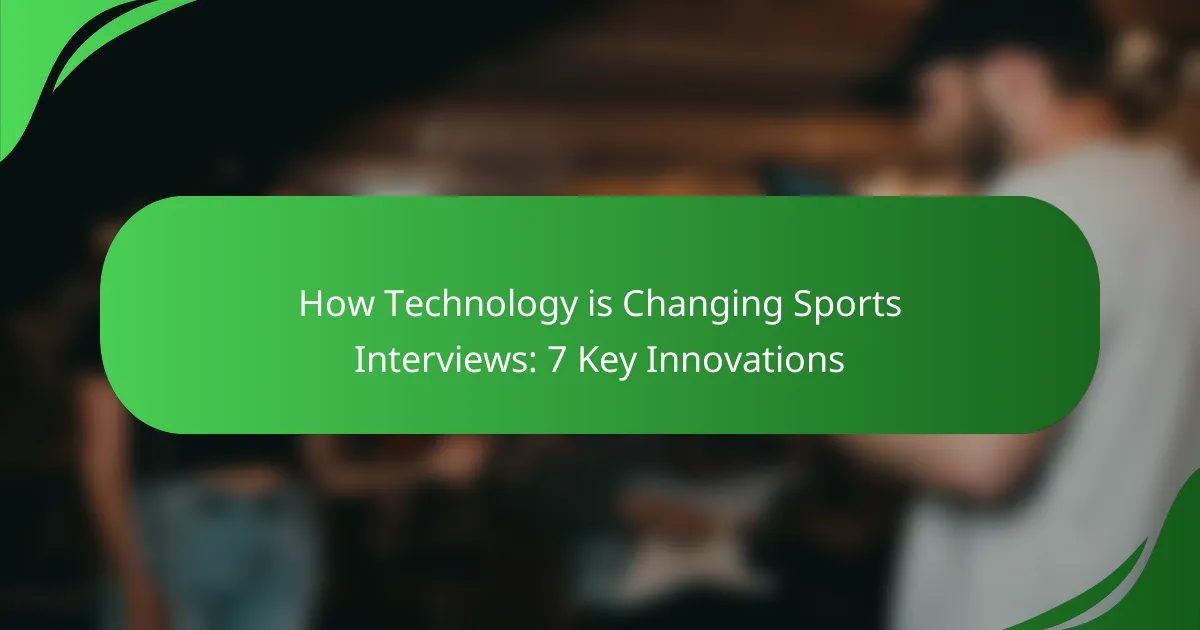The rise of podcasting in sports interviews is transforming how fans connect with their favorite athletes. This medium offers a unique opportunity for in-depth discussions and personal storytelling, allowing athletes to engage with their audience in a more meaningful way. As a result, sports podcasts are becoming an essential tool for enhancing fan engagement and visibility in the competitive sports landscape.

Why is podcasting gaining popularity in sports interviews?
Podcasting is becoming increasingly popular in sports interviews due to its convenience and ability to connect fans with athletes in a more personal way. The format allows for in-depth discussions that traditional media often cannot provide, making it an appealing choice for both listeners and interviewees.
Increased accessibility for fans
Podcasting offers fans easy access to sports interviews anytime and anywhere, whether they are commuting, exercising, or relaxing at home. This flexibility allows listeners to engage with content on their own terms, without the constraints of scheduled broadcasts.
Moreover, many podcasts are available for free, making them an economical option for fans who want to stay updated on their favorite sports and athletes. The wide variety of platforms hosting podcasts ensures that fans can find content that suits their interests.
Engagement through storytelling
Podcasts excel at storytelling, allowing athletes to share their personal experiences and insights in a compelling way. This narrative style fosters a deeper connection between the athlete and the audience, as listeners can relate to the challenges and triumphs shared during interviews.
By focusing on storytelling, podcasts can highlight lesser-known aspects of an athlete’s journey, making the content more engaging and memorable. This approach not only entertains but also educates fans about the sport and its players.
Direct athlete interaction
Podcasting facilitates direct interaction between athletes and their fans, often allowing listeners to submit questions or topics for discussion. This level of engagement creates a sense of community and makes fans feel more involved in the conversation.
Additionally, many podcasts feature live recordings or Q&A sessions, further enhancing the connection between athletes and their audience. This direct communication helps to humanize athletes, breaking down barriers and fostering loyalty among fans.

What are the benefits of sports podcasts for athletes?
Sports podcasts offer athletes a platform to connect with fans, share their stories, and enhance their visibility in the competitive sports landscape. By engaging in podcasts, athletes can build a more personal connection with their audience, which can lead to various opportunities for growth and success.
Enhanced personal branding
Podcasts allow athletes to showcase their personalities and values, contributing to a stronger personal brand. By sharing insights into their lives, training regimens, and experiences, athletes can differentiate themselves from others in their sport.
For example, an athlete discussing their journey through adversity can resonate with listeners, fostering loyalty and admiration. This personal touch can lead to increased fan engagement and a more substantial social media following.
Opportunities for sponsorships
As athletes build their personal brands through podcasts, they often attract sponsorship deals. Brands are keen to partner with athletes who have a strong connection with their audience, as this can enhance their marketing efforts.
For instance, an athlete with a dedicated podcast audience may receive offers from companies looking to promote sports gear or health products. Athletes should actively seek out these opportunities and consider how their podcast content aligns with potential sponsors’ values and target demographics.
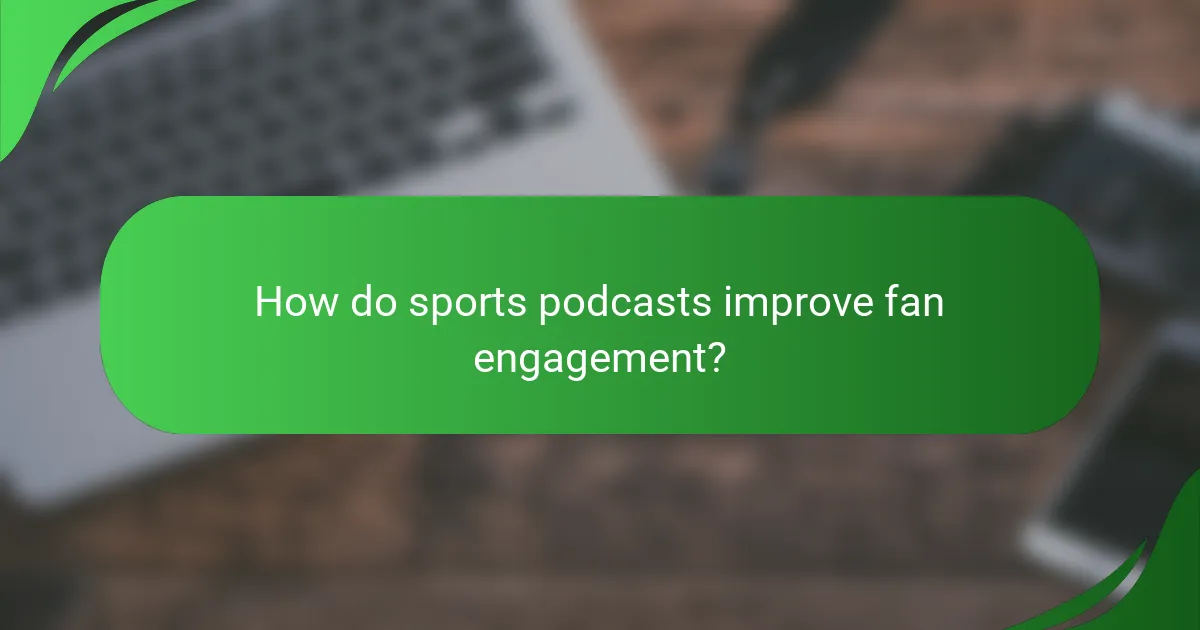
How do sports podcasts improve fan engagement?
Sports podcasts enhance fan engagement by offering unique content that deepens the connection between fans and their favorite teams or athletes. They provide a platform for in-depth discussions, exclusive interviews, and real-time insights, making fans feel more involved in the sports community.
Real-time insights and analysis
Sports podcasts deliver timely insights and analysis that keep fans informed about ongoing games, player performances, and team strategies. By featuring expert commentators and analysts, these podcasts break down complex plays and decisions, allowing listeners to gain a deeper understanding of the sport.
For example, during a live game, a podcast might provide instant reactions and tactical breakdowns, which can enhance the viewing experience. This immediacy helps fans feel connected to the action as it unfolds, creating a more immersive experience.
Community building through discussions
Podcasts foster community by encouraging listener participation and discussions around shared interests in sports. Many shows invite fans to call in or engage through social media, creating a dialogue that strengthens the bond among listeners.
Additionally, hosting live events or meet-ups can further enhance this sense of community, allowing fans to connect with each other and the podcast hosts. This interaction not only builds loyalty but also transforms passive listeners into active participants in the sports conversation.

What are the top sports podcasts in the UK?
The top sports podcasts in the UK include a variety of shows that cater to different interests, from football to general sports discussions. These podcasts engage audiences with expert insights, interviews, and analyses, making them popular among sports enthusiasts.
The High Performance Podcast
The High Performance Podcast focuses on the mindset and habits of elite athletes and coaches. Hosted by Jake Humphrey and Damian Hughes, it features in-depth interviews that reveal the secrets behind high achievement in sports.
This podcast is particularly valuable for listeners looking to understand the psychological aspects of performance. Each episode typically runs for about an hour, making it easy to fit into a busy schedule.
Football Weekly
Football Weekly is a popular podcast that covers the latest news and events in football, primarily focusing on the Premier League. Hosted by a team of knowledgeable journalists, it provides analysis, opinions, and lively discussions about matches and player performances.
Episodes usually last around 45 minutes to an hour, making it accessible for fans who want to stay updated on football happenings. The podcast often includes listener questions and interactions, enhancing the community feel among football fans in the UK.
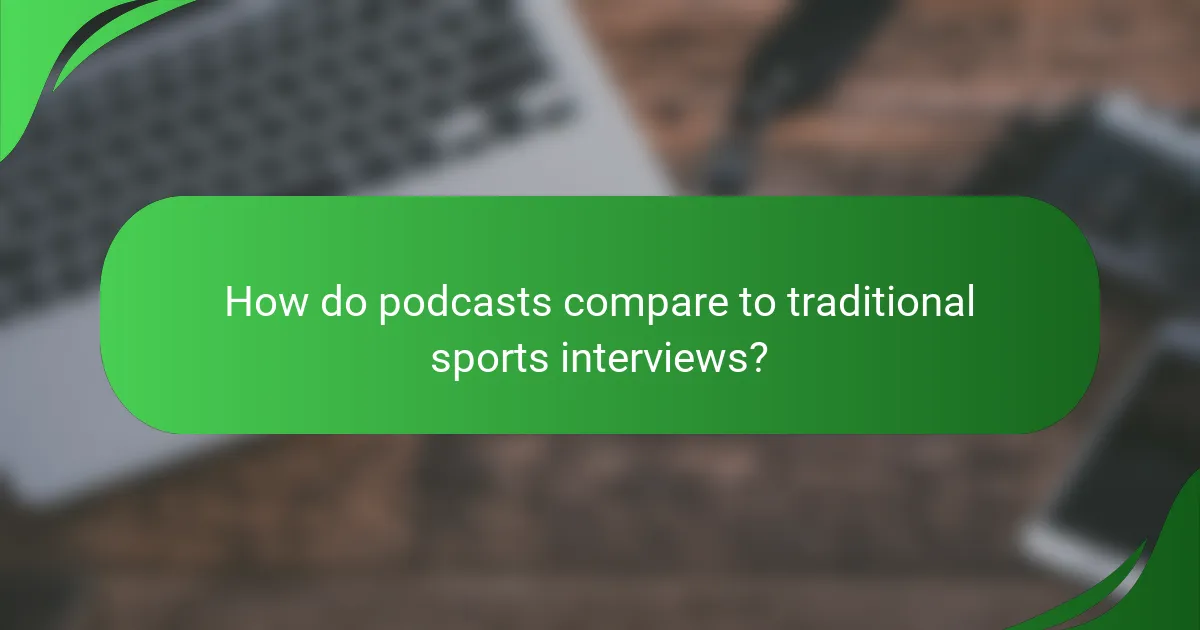
How do podcasts compare to traditional sports interviews?
Podcasts offer a more flexible and engaging format compared to traditional sports interviews, allowing for deeper discussions and a more personal connection with the audience. Unlike conventional interviews, which often adhere to strict time limits and scripted questions, podcasts can explore topics in greater detail and foster a more relaxed atmosphere.
Longer, in-depth conversations
Podcasts typically allow for longer conversations, often lasting from 30 minutes to over an hour. This extended format enables hosts and guests to delve into complex topics, share personal stories, and provide insights that are often glossed over in shorter interviews. For example, a podcast episode might explore an athlete’s career journey, mental health challenges, or training regimens in ways that traditional media cannot.
Listeners appreciate the depth of content, as it provides a richer understanding of the subject matter. This format can also attract a dedicated audience, as fans are more likely to engage with content that resonates on a personal level.
Less scripted and more authentic
Podcasts tend to be less scripted than traditional interviews, allowing for a more natural flow of conversation. This authenticity can lead to spontaneous moments that reveal the true personality of the guest, creating a stronger connection with the audience. For instance, a candid discussion about a recent game or a personal setback can resonate more deeply than a rehearsed response.
Moreover, this informal style encourages guests to express their thoughts freely, leading to unique insights and perspectives that might not emerge in a structured interview setting. As a result, listeners often feel a sense of intimacy and relatability, enhancing their overall experience.
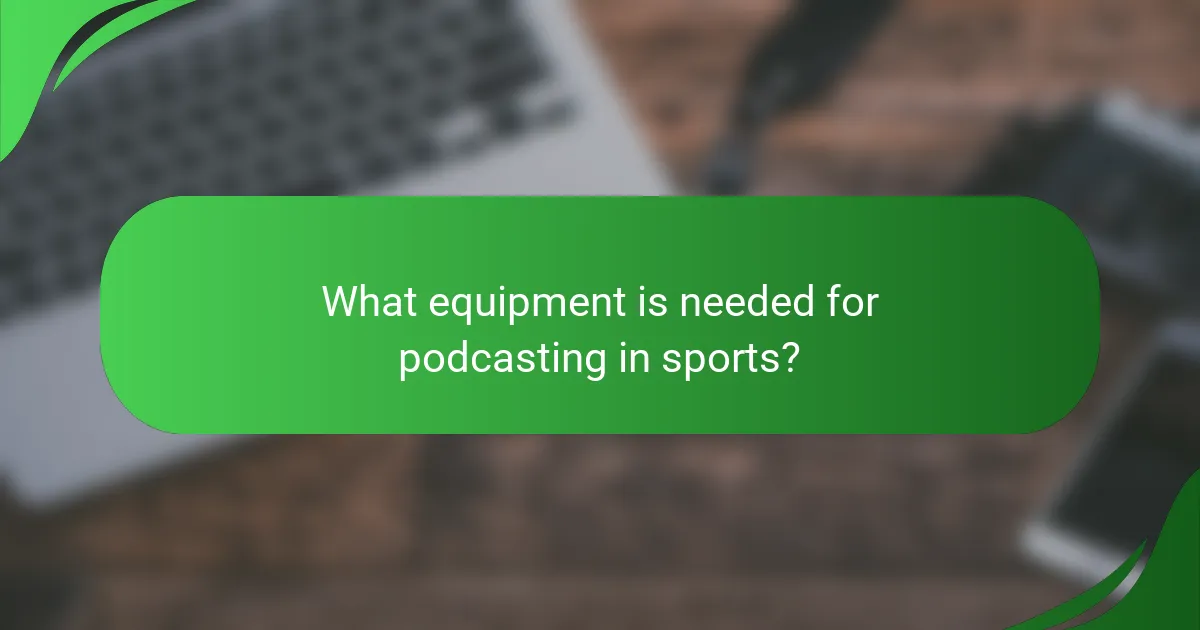
What equipment is needed for podcasting in sports?
To successfully podcast in the sports realm, you’ll need a few essential pieces of equipment. Quality microphones and audio editing software are crucial for producing clear and professional-sounding interviews.
Quality microphones
A good microphone is vital for capturing clear audio during sports interviews. Consider dynamic microphones for their durability and ability to reject background noise, making them ideal for lively environments like stadiums or gyms.
Popular options include USB microphones for ease of use and XLR microphones for higher quality, which require an audio interface. Aim for a microphone that fits your budget, typically ranging from $50 to $300, depending on the features and quality you need.
Audio editing software
Audio editing software is essential for refining your podcast recordings. Programs like Audacity and Adobe Audition allow you to edit, mix, and enhance audio tracks, ensuring a polished final product.
When choosing software, consider user-friendliness and the features you require, such as noise reduction and multi-track editing. Many options are available, from free software to premium subscriptions, typically ranging from $0 to $30 per month.
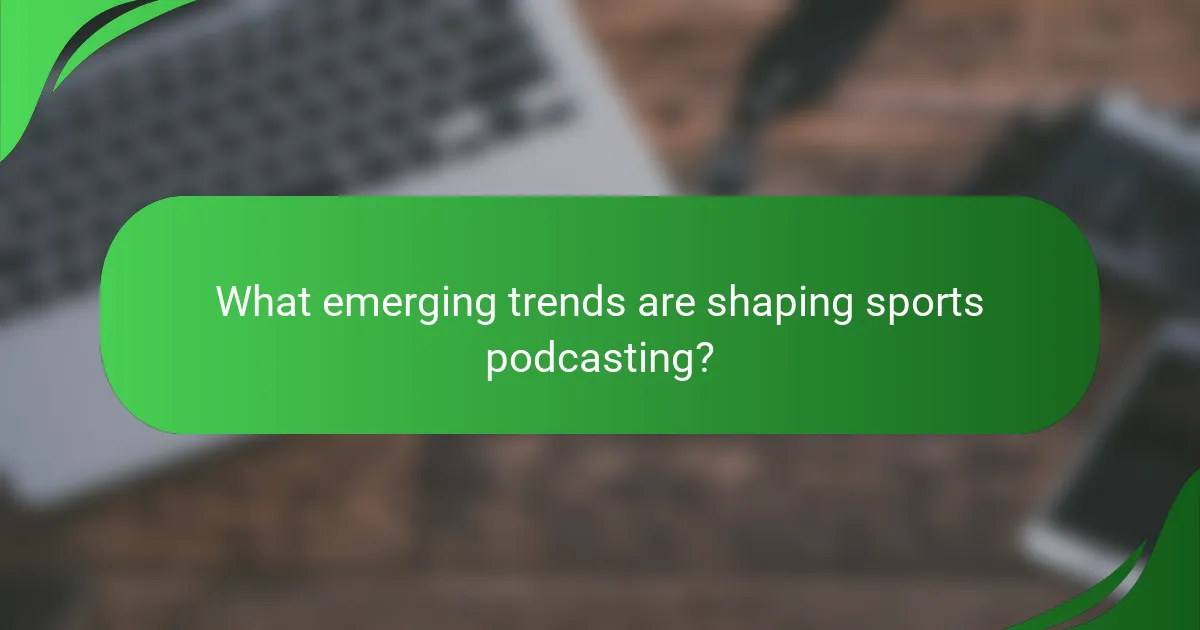
What emerging trends are shaping sports podcasting?
Emerging trends in sports podcasting are significantly transforming how content is created and consumed. Key developments include the integration of video content and the increased use of analytics for audience targeting, both of which enhance engagement and reach.
Integration of video content
Integrating video content into sports podcasts allows creators to reach a broader audience by utilizing platforms like YouTube and social media. This trend enables listeners to engage visually, enhancing the overall experience and making the content more shareable.
For instance, many sports podcasts now feature live recordings of interviews, allowing fans to see the interactions and emotions of the guests. This approach not only attracts more viewers but also encourages deeper connections with the audience.
Increased use of analytics for audience targeting
The use of analytics in sports podcasting is becoming essential for understanding audience preferences and behaviors. By analyzing listener data, podcasters can tailor their content to better meet the interests of their audience, leading to higher engagement rates.
Podcasters can utilize metrics such as listener demographics, episode completion rates, and feedback to refine their topics and guest selections. This targeted approach helps in creating content that resonates more effectively, potentially increasing listener loyalty and attracting sponsors.
